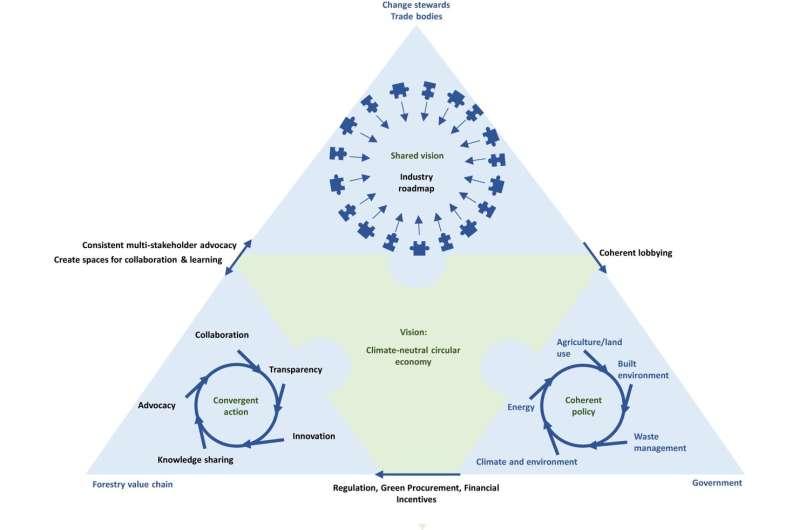This article has been reviewed according to Science X's editorial process and policies. Editors have highlighted the following attributes while ensuring the content's credibility:
fact-checked
peer-reviewed publication
trusted source
proofread
Recycling used wood can make a big contribution to net zero, but needs much better coordination

As global demand for wood is forecast to increase by up to 170% by 2050, a new study published in Nature Communications demonstrates the importance of achieving net zero targets through the better use of waste wood and proposes solutions for how this could be achieved.
Wood harvested from managed forests is increasingly recognized as an important source of renewable biomaterial. It can deliver major benefits for reducing global warming, including capturing carbon dioxide from the atmosphere as trees grow, storing that carbon in products manufactured from the harvested wood, and reducing emissions when these products are used in place of materials like concrete and steel.
A team of researchers from Bangor University, the University of Galway in Ireland and Woodknowledge Wales, using a rigorous analysis of the whole life cycle of this system, found that potential benefits for net zero are not being maximized with the current way that wood products are used in U.K.
While less than 1% of waste wood goes to landfill in U.K., far too many wood products are simply burnt after their first use as biomass for generating electricity or heat, when instead they could be re-used or recycled into new products that continue to store their carbon. The inefficiency of the present system also means that trees are harvested at a much greater rate than is necessary to provide new wood for manufacturing. This really matters for the U.K. as the imports of wood products in 2022 cost £11.5 billion.
The evidence produced by this research shows that improving the use of waste wood products would deliver a rapid and sustained reduction of 78% in carbon emissions by 2050 compared with the current, mainly single-use approach. This immediate decarbonization benefit results from the reduction in demand for newly harvested timber and compliments the slower, more long-term benefits of planting new forests for wood production. Combining all of these approaches would achieve a reduction in emissions equivalent to 258.8 million tons of carbon dioxide, cumulatively by 2050 (which equals 61% of the total of net territorial emissions of the U.K. in the single year of 2021).
Drawing on interviews with industry leaders, the study also explores how it would be possible to deliver a more circular model for wood use in reality. It indicates that:
- the industry needs to collaborate in new ways to provide the necessary cross-sector coordination;
- proposals for government policy interventions such as compulsory deconstruction plans for buildings are required, and;
- manufacturers need to extend responsibility for how their products are used (and reused) to maximize the benefits for slowing global warming.
Eilidh Forster, a Ph.D. researcher at Bangor University and lead author of the study commented "The U.K. is currently able to produce only a fraction of the wood it requires, yet recovered wood 'waste' is an under-valued resource. Improved transparency, reporting and management of recovered wood could create a multitude of circular business opportunities."
John Healey, study co-author and Professor of Forest Sciences at Bangor University emphasized that "planting new production forests to meet future wood demand is a very important priority for achieving net zero, however it will take several decades for this benefit to be realized, and we can't afford to wait that long to reduce the current rate of global warming. Therefore, we also need to act urgently to increase the efficiency with which we reuse current wood products to reduce the pressure that we are placing on global forests to meet our needs."
David Styles, associate professor in agri-sustainability at the University of Galway and co-author of the study explained that "to substantially increase the efficiency of the whole system will require some significant changes in the wood using industries in U.K., backed-up by better-targeted government policies, to substantially improve their co-ordination from afforestation to better wood recovery and reuse."
Gary Newman, chief executive of Woodknowledge Wales and co-author of the study observed that "moving to a circular economy is difficult but absolutely essential if we are to meet both our future decarbonization targets as well as our future resource needs. This paper shows the size of the win and makes practical suggestions for how we might get there. Woodknowledge Wales is an experiment in the kind of cross-sector coordination advocated by this research."
More information: Eilidh J. Forster et al, Circular wood use can accelerate global decarbonisation but requires cross-sectoral coordination, Nature Communications (2023). DOI: 10.1038/s41467-023-42499-6
Journal information: Nature Communications
Provided by Bangor University



















